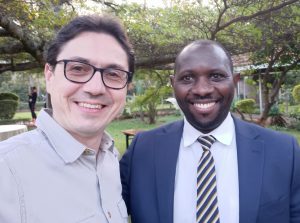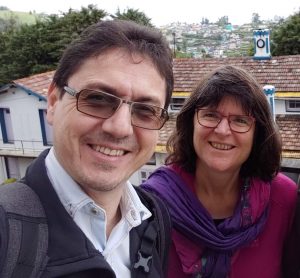Ricardo Borges, IFES Secretary for Scripture Engagement, interviews Wilson Kiuna, from Kenya, member of the IFES global network of Scripture Engagement multipliers
Why might it be important to ask questions of Scripture in the light of challenges we face in this world, such as the issue of politics?
We need to ask questions of Scripture primarily because the Bible is the revelation of God’s mind about the whole of reality; it guides how God’s people are to live, interpret, and wrestle with the issues and challenges of everyday life – across time, space, and culture (Deut. 32:47; 2 Tim 3:16-17). I also see in the Bible a humbling truth: the almighty God, who dwells in unapproachable light, yet invites us to [have a] dialogue with Him in our honest struggles. God is big enough to handle our doubts, anxieties, fears, frustrations. This certainly includes the trauma of broken socio-economic and political reality, as Gideon illustrates for us (e.g., Judg 6:13).
How best to ask questions of Scripture?
First, we need to appreciate the context of the lives of the communities of faith in the Bible; how they interpreted their own challenges; the kind of questions they asked – and to do this in light of God’s overall story in the Bible. Thus, using all our senses, we will try to immerse ourselves in their grief and lamentations, their joys and hope. Secondly, we need to study Scripture in community with others, with our feet grounded in our contemporary realities. This illuminates and deepens our vision.
The Bible is quite extensive and God’s revelation is given to us as a wide variety of content in different formats. As such, how do we know where to look for answers to the questions we ask?
I think it’s absolutely important to affirm that ALL SCRIPTURE is divinely inspired, and useful for all of life (2 Tim 3:16-17) – including inconvenient particularities of it, such as filing our tax returns! There is an essential theological unity that connects the entire Biblical story, pointing to, and ultimately finding fulfilment in Jesus Christ (Jn 5:39ff). In this regard, we begin to look for answers to our questions not merely to satisfy intellectual curiosity, but to respond in obedience to a personal invitation by Jesus himself “to come and have life” (Jn 5:40). So, we approach this quest with a humble plea for illumination and guidance, that whatever our starting point in Bible study, the Holy Spirit, our trustworthy teacher, will “open my eyes to see wonderful things in your law” (Psa 119:18).
What is the benefit of asking these questions with people who are different from us?
I believe that this practice helps us appreciate our ‘fellowship of neediness’ as God’s people – regardless of our cultural, gender, socio-economic and other aspects of diversity; we are all so needy of the grace of God! Second, this practice enriches our discernment of Biblical truth, as people share hermeneutical resources and tools from other cultures and lived experiences (cultural idiom, stories and anecdotes etc.), and illustrations of use of Scripture in real life. Thirdly, it provides a ‘redemptive’ challenge to our personal and cultural blind spots, which so often frustrate our Scripture engagement.
How do we deal with questions that the Scriptures ask of us in return?
I think it is a redemptive act of God’s mercy whenever Scriptures ask us questions – especially those that confront our various shortcomings. It often invites us into self-examination and realignment (Psa 139:23-24). This transformative aspect requires us to cultivate a contrite, teachable spirit (Psa 32:8-10), and the ‘Berean’ diligence of searching the Scriptures in community (Acts 17:11).



